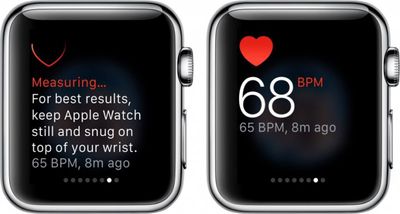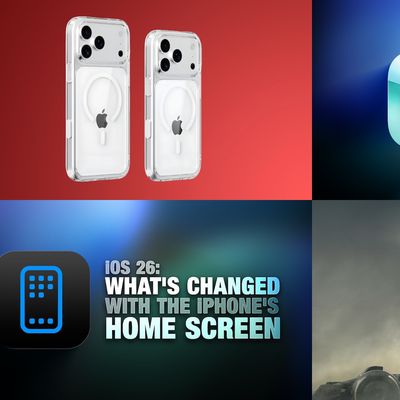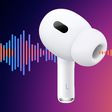Apple Working With Stanford to Determine If Apple Watch Can Detect Abnormal Heart Rhythms
Apple is planning to work with Stanford and telemedicine vendor American Well to determine whether the heart rate sensor in the Apple Watch can be used to detect abnormal heart rhythms and common heart conditions, reports CNBC.
An Apple Watch, if able to accurately detect arrhythmias, or abnormal heart patterns, could identify patients that are at a high risk of atrial fibrillation or similar conditions. Heart arrhythmias aren't always symptoms of a serious disease, but Apple Watch owners could find out about a problem from the Apple Watch and then get it checked out at a doctor if the device is determined to accurately predict heart problems.

"Atrial fibrillation is a common rhythm disorder and knowing someone has it is medically useful because those people might need specific treatments," said Bob Wachter, chair of the Department of Medicine at the University of California San Francisco.
A study conducted by the University of California, San Francisco and the team behind the Cardiogram app previously determined that the Apple Watch was able to detect abnormal heart rhythms with 97 percent accuracy. Apple could get even better results as it has access to raw data.
Just today, Apple CEO Tim Cook talked about Apple's health interests in an interview with Fortune. He said Apple is "extremely interested" in health, and that it represents a major business opportunity.
If you look at it, medical health activity is the largest or second-largest component of the economy, depending on which country in the world you're dealing with. And it hasn't been constructed in a way where the focus at the device level is making great products from a pure point of view. The focus has been on making products that can get reimbursed through the insurance companies, through Medicare, or through Medicaid. And so in some ways we bring a totally fresh view into this and say, 'Forget all of that. What will help people?'
Cook also said that Apple has been surprised to learn how the heart rate monitoring in the Apple Watch has already been helping people. Many people collect data with the Apple Watch, notice something amiss, and then go to the doctor to get it checked out. "A not-insignificant number have found out if they hadn't come into the doctor they would have died," said Cook.
Apple's study in partnership with American Well and Stanford is set to begin later this year, according to CNBC's sources.
Popular Stories
A new Apple TV is expected to be released later this year, and a handful of new features and changes have been rumored for the device.
Below, we recap what to expect from the next Apple TV, according to rumors.
Rumors
Faster Wi-Fi Support
The next Apple TV will be equipped with Apple's own combined Wi-Fi and Bluetooth chip, according to Bloomberg's Mark Gurman. He said the chip supports ...
Apple will launch its new iPhone 17 series in two months, and the iPhone 17 Pro models are expected to get a new design for the rear casing and the camera area. But more significant changes to the lineup are not expected until next year, when the iPhone 18 models arrive.
If you're thinking of trading in your iPhone for this year's latest, consider the following features rumored to be coming...
Apple's next-generation iPhone 17 Pro and iPhone 17 Pro Max are only two months away, and there are plenty of rumors about the devices.
Below, we recap key changes rumored for the iPhone 17 Pro models.
Latest Rumors
These rumors surfaced in June and July:A redesigned Dynamic Island: It has been rumored that all iPhone 17 models will have a redesigned Dynamic Island interface — it might ...
The long wait for an Apple Watch Ultra 3 is nearly over, and a handful of new features and changes have been rumored for the device.
Below, we recap what to expect from the Apple Watch Ultra 3:Satellite connectivity for sending and receiving text messages when Wi-Fi and cellular coverage is unavailable
5G support, up from LTE on the Apple Watch Ultra 2
Likely a wide-angle OLED display that ...
iPhone 17 Pro and iPhone 17 Pro Max models with displays made by BOE will be sold exclusively in China, according to a new report.
Last week, it emerged that Chinese display manufacturer BOE was aggressively ramping up its OLED production capacity for future iPhone models as part of a plan to recapture a major role in Apple's supply chain.
Now, tech news aggregator Jukan Choi reports...
The iOS 26 public beta release is quickly approaching, while developers have recently gotten their hands on a third round of betas that has seen Apple continue to tweak features, design, and functionality.
We're also continuing to hear rumors about the iPhone 17 lineup that is now just about right around the corner, while Apple's latest big-budget film appears to be taking off, so read on...









 ('https://www.macrumors.com/2017/09/11/apple-watch-stanford-abnormal-heart-rhythms/')
('https://www.macrumors.com/2017/09/11/apple-watch-stanford-abnormal-heart-rhythms/')










